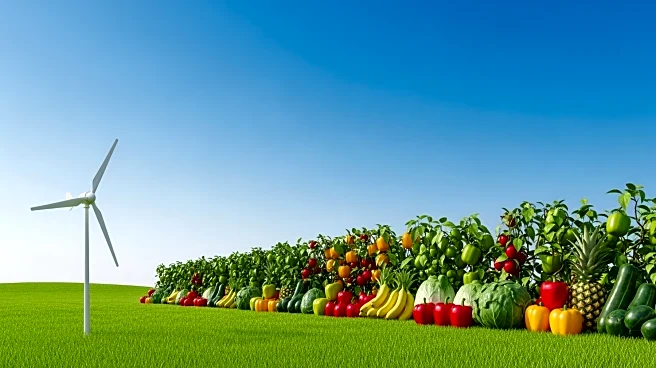What's Happening?
The United States low-carbon agriculture market is anticipated to grow significantly, reaching $1,719.02 million by 2032. This growth is driven by the increasing adoption of sustainable farming practices
and the rising demand for eco-friendly, low-emission agricultural solutions. The market encompasses technologies and solutions such as precision farming, organic inputs, renewable energy integration, and carbon sequestration techniques. Recent developments in the U.S. include the accelerated adoption of AI-driven emissions management platforms and the expansion of carbon credit trading opportunities. Major corporations have invested over $200 million in projects focused on low-carbon feed production and methane reduction in cattle farming, utilizing precision farming and IoT technologies.
Why It's Important?
The expansion of the low-carbon agriculture market is crucial for addressing climate change impacts and promoting environmental sustainability in agriculture. By adopting sustainable practices, the sector aims to reduce greenhouse gas emissions and enhance productivity. This shift is supported by government policies and incentives, which encourage low-emission farming practices. The growth of this market presents opportunities for agri-tech companies, carbon credit buyers, and regulatory bodies to collaborate and innovate. As demand for sustainable food products increases, the market's expansion could lead to significant environmental and economic benefits, fostering a more resilient agricultural sector.
What's Next?
The U.S. low-carbon agriculture market is expected to continue its growth trajectory, driven by advancements in agricultural technologies and practices. The expansion of carbon credit trading and the adoption of AI-driven platforms are likely to further enhance sustainable outcomes across American farms. As corporations invest in low-carbon initiatives, the market may see increased collaboration between agri-tech companies and farmers, promoting regenerative agriculture practices. The ongoing support from government policies and incentives will likely play a pivotal role in shaping the future of the market, encouraging further innovation and adoption of sustainable farming solutions.
Beyond the Headlines
The shift towards low-carbon agriculture has broader implications for the U.S. agricultural sector, including ethical and cultural dimensions. As farmers adopt sustainable practices, there is potential for increased awareness and education on environmental issues, fostering a culture of sustainability. The integration of AI and IoT technologies in farming could lead to long-term shifts in how agriculture is conducted, emphasizing efficiency and resource conservation. Additionally, the market's growth may influence regulatory standards, prompting stricter guidelines for greenhouse gas emissions and encouraging more sustainable practices across the industry.











